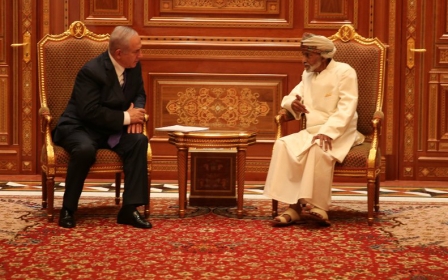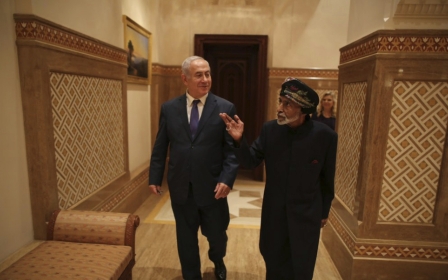After Oman, Israeli officials' Gulf trips signal new diplomatic detente
Following Prime Minister Benjamin Netanyahu’s surprise visit to Oman, a deluge of top Israeli officials is set to visit Gulf Arab countries that do not formally recognise Israel.
Israeli Culture Minister Miri Regev has been in Abu Dhabi for four days. She touched down in the emirate on Thursday, coinciding with Netanyahu's trip to Oman, where he met with Sultan Qaboos bin Said.
Meanwhile, Israeli Communications Minister Ayoub Kara headed to an International Telecommunications Union conference in Dubai on Monday, and Transportation Minister Israel Katz is set to attend a global transportation meeting in Muscat next week.
Katz received an invite from his Omani counterpart - the first time an Israeli minister has been invited to such an event in the sultanate.
In recent years, Netanyahu has insisted that relations between Israel and Gulf Arab countries have been improving, without much official evidence. None of the seven Gulf Arab countries officially recognise Israel.
Yet this recent spate of official visits appears to show that the backchannel dialogue between Tel Aviv and Gulf countries has been making cut-through. Sultan Qaboos' invitation to Netanyahu came after lengthy communications, the premier's office said.
"Israel is a state present in the region, and we all understand this," Yusuf bin Alawi bin Abdullah, Oman's foreign minister, said following the meeting.
"The world is also aware of this fact. Maybe it is time for Israel to be treated the same [as others states] and also bear the same obligations."
Bahrain on Saturday hailed Sultan Qaboos for hosting Netanyahu and the rest of the Israeli delegation.
“We have never questioned the wisdom and farsightedness of his majesty Sultan Qaboos in trying to help and do their part in trying to reach a solution for this [Palestinian-Israeli] issue,” Bahrain’s Foreign Minister Khalid al-Khalifa said at the Manama Dialogue, a Middle East security summit.
Israeli anthem
On Sunday Regev, a former Israeli army spokesperson, watched her country's judoka team compete in the International Judo Federation’s Grand Slam in Abu Dhabi. The next day she toured the emirate's Sheikh Zayed Grand Mosque alongside UAE officials.
Israel’s national anthem, Hatikvah, was played for the first time in the United Arab Emirates after Israeli judo athlete Sagi Muki won the gold medal at the International Judo Federation’s Grand Slam in Abu Dhabi.
“We made history. The people of Israel live!” she tweeted after the anthem was played. Previously Israelis have only been allowed to compete at the event without showing their national flag.
The Bahraini National Orchestra played the Hatikvah - which calls for the mass return of Jews in the diaspora to "the Jewish homeland" - at a celebration of Bahraini “religious tolerance” in September last year.
This regime seeks to create divisions between Muslim countries and obscure 70 years of usurpation, rape and killing of the oppressed Palestinians
- Iranian spokesperson Bassam Ghasemi
However not everyone in the region is welcoming Israel with open arms. Iran condemned Netanyahu’s Oman visit, claiming that it was a tactic to sow division.
“This regime seeks to create divisions between Muslim countries and obscure 70 years of usurpation, rape and killing of the oppressed Palestinians,” Iranian spokesperson Bassam Ghasemi said.
Israel’s growing ties with Arab Gulf states stems from a mutual distrust of Iran. US President Donald Trump has encouraged this rapprochement and sees Saudi Arabia and other allies in the region as important players in his policy of confronting Tehran.
Middle East Eye propose une couverture et une analyse indépendantes et incomparables du Moyen-Orient, de l’Afrique du Nord et d’autres régions du monde. Pour en savoir plus sur la reprise de ce contenu et les frais qui s’appliquent, veuillez remplir ce formulaire [en anglais]. Pour en savoir plus sur MEE, cliquez ici [en anglais].



